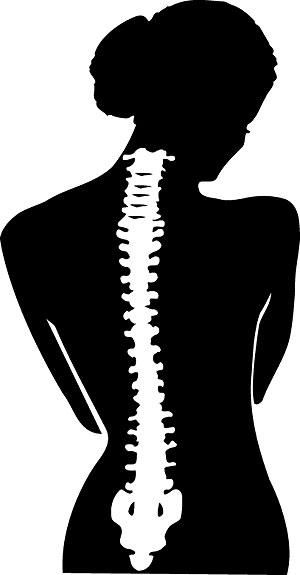
Doctors have identified specific areas of multiple sclerosis damage that correlate with specific MS symptoms and impairments. Depending on the location of a lesion (MS nerve demyelination), the resulting damage will affect sensory perceptions, motor skills, vision, balance, swallowing, and so on.
Spinal cord attacks— those that occur anywhere on the spinal cord from the cervical region (the neck) down to the thoracic region (mid-back)— are the most common form of MS relapses (approximately 42%) and can result in the following impairments:
Sensory Functions
paresthesia: unpleasant sensations in the limbs and torso such as pins-and-needles or tingling, buzzing, hot and cold sensations, wetness, banding or tightening around the mid or upper torso (the “MS hug”), or vibrating sensations
Lhermitte’s sign: a very common sensation of tingling or electrical impulses that radiate from the neck down into the arms and legs when the head is bent forward
numbness: this can be mild, with a slight impairment of feeling, or more pronounced, with the inability to sense one’s limbs or trunk, causing problems with sitting and movements (clumsiness)
Motor Functions
spasticity: muscle spasms that cause rigidity and involuntary jerking in the limbs and trunk. The legs are the most common area for this to happen. Spasticity can increase at night or with fatigue, and a common complaint is “restless leg syndrome”, where leg muscles will alternate between jerking and cramping. Muscle stiffness is another problem.
weakness: heaviness and/or tiredness in the limbs. Often noted at “walking through cement” or “having lead limbs.” This can cause problems with walking, standing, and dexterity (including problems with writing and properly using the hands.) Sometimes rest can help limb weakness.
Bodily Functions
bladder and bowel problems: these can include emptying and/or holding the bladder or bowel. The muscles that control these are compromised and problems with bladder infections and constipation can result. Also, urgency can be increased and holding becomes an issue.
sexual dysfunctions: men and women can have numbness and tingling in the genital regions, and problems with erections and arousal
Reference :
- Rosner, Louis J, MD, and Shelley Ross. Multiple Sclerosis: New Hope and Practical Advice for People with MS and their Families. Simon & Schuster: New York, NY, 2008.

